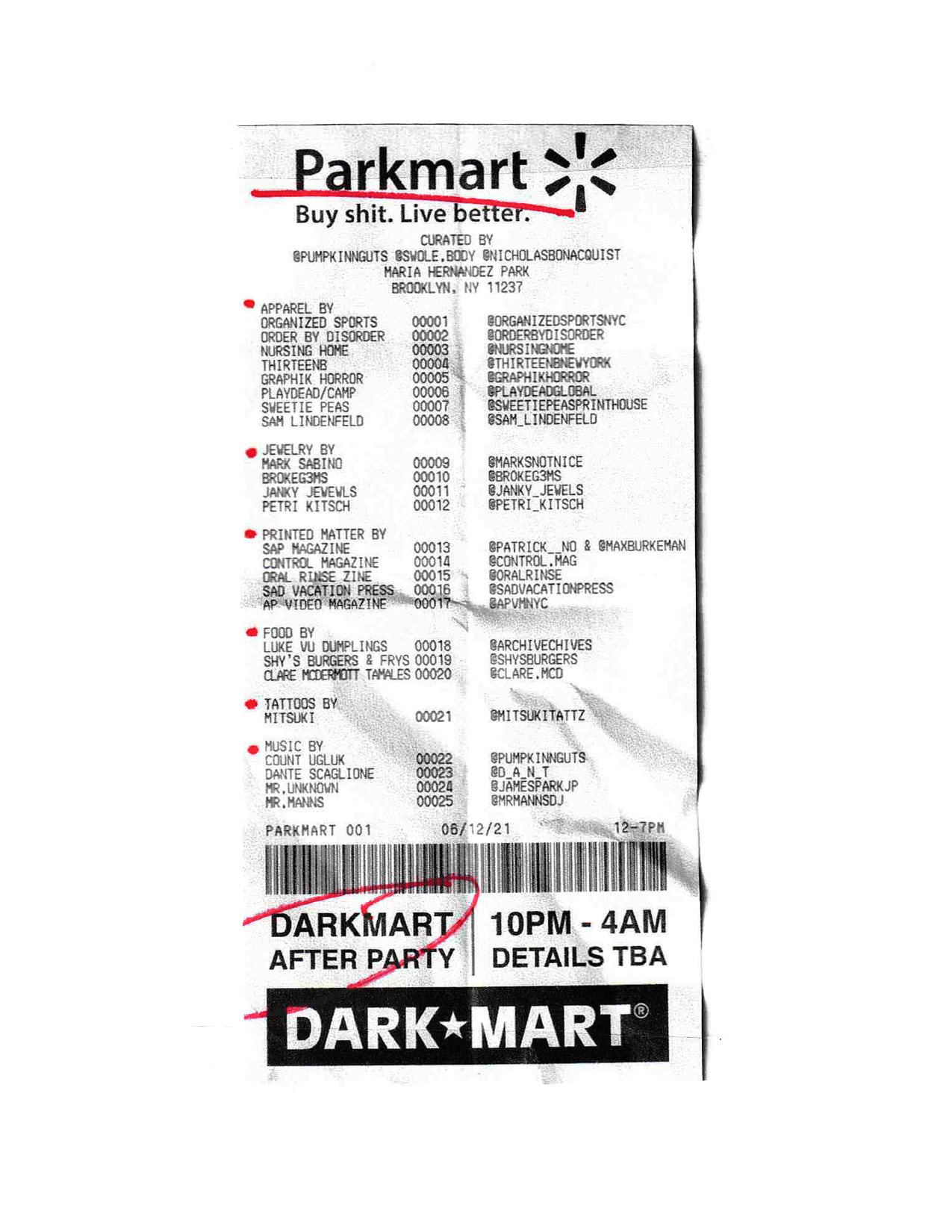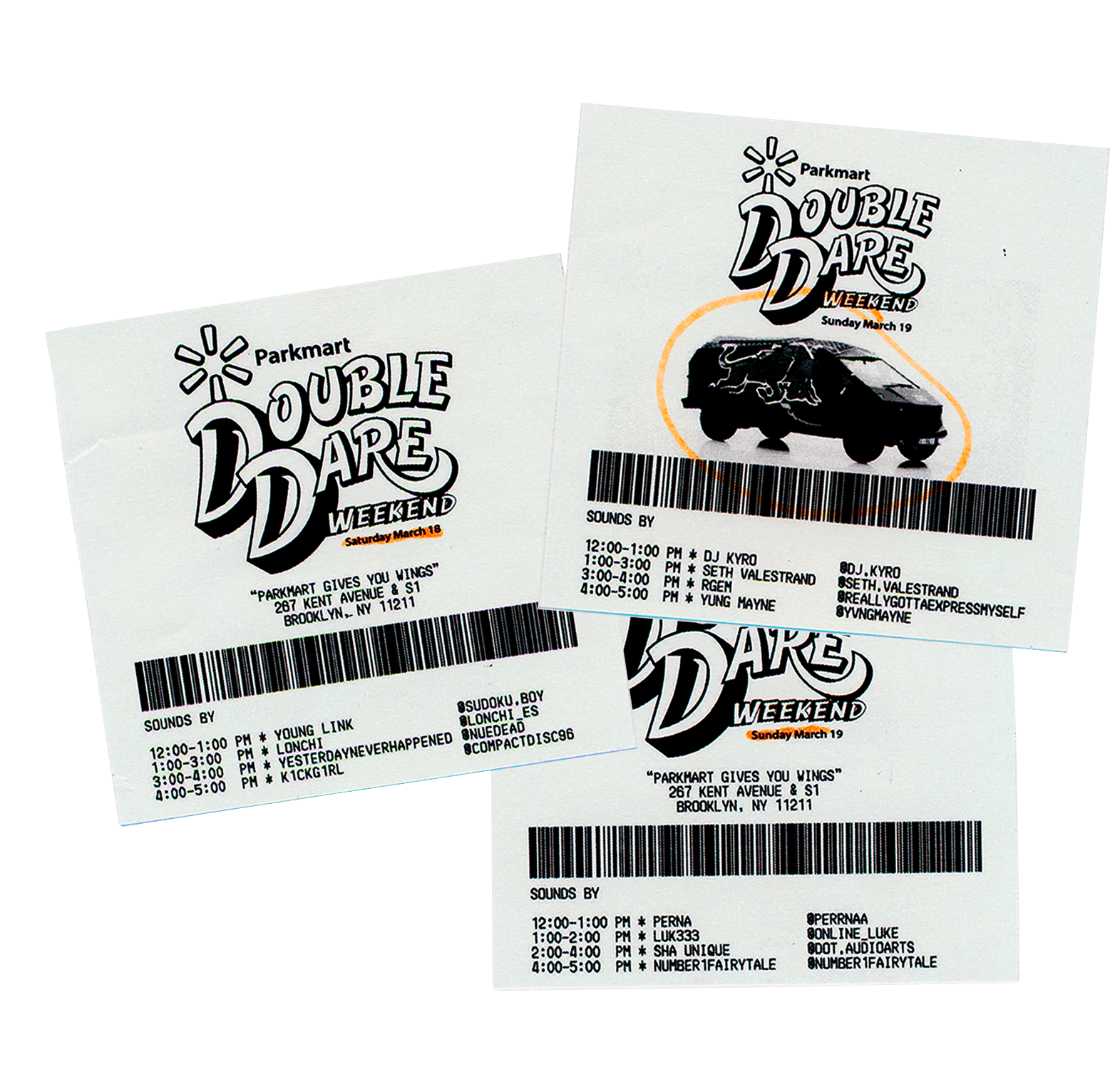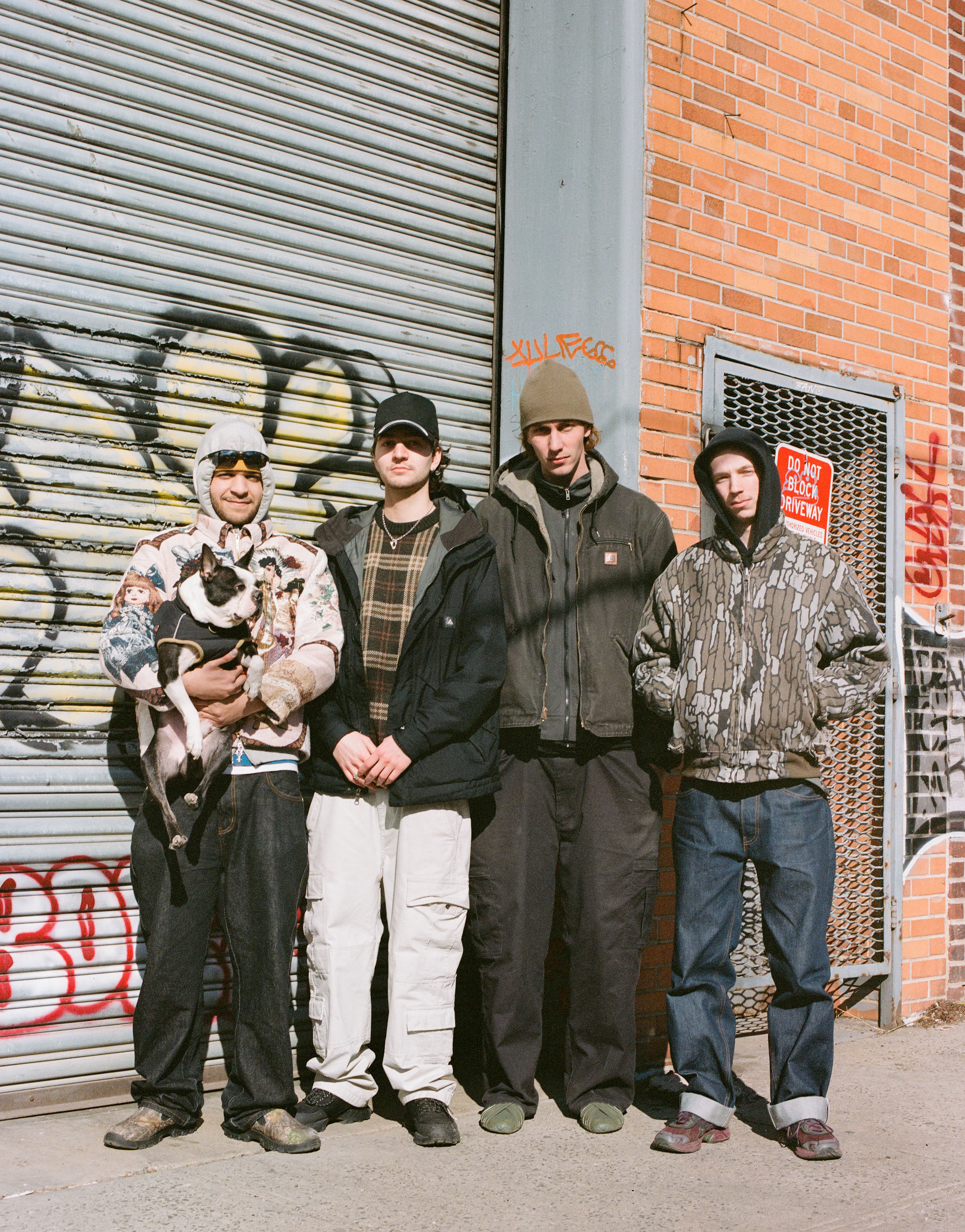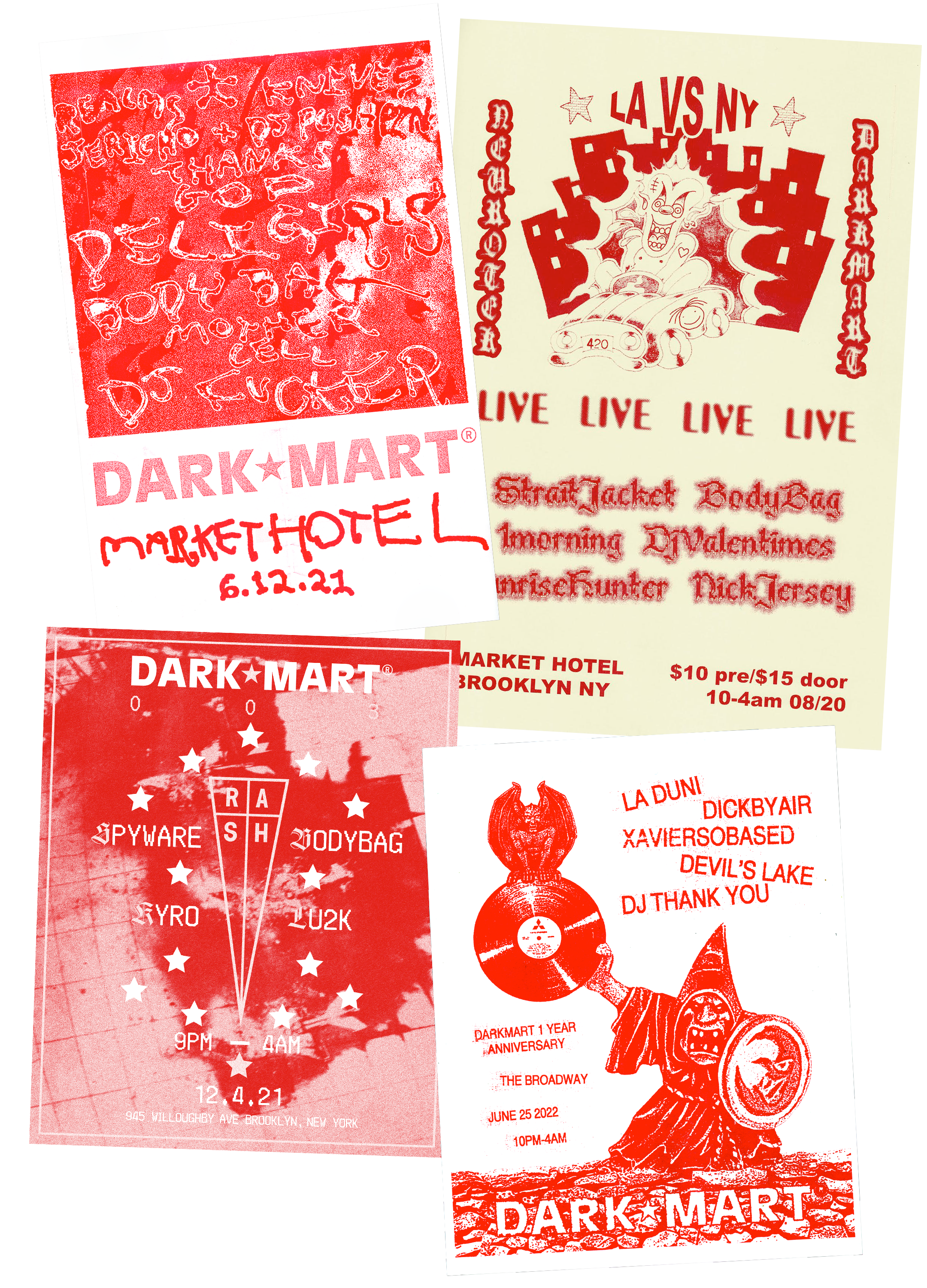
More Than a Flea Market,
Inside NYC's Parkmart
Photography and Words by Patrick No
Founded by four skaters, Parkmart is a community-centralized flea market that has its roots in Brooklyn, New York. Originally doing their markets in parks around town, they’ve branched off into holding their events in spaces on Allen St and warehouses in Williamsburg. I chat with the head honchos at their largest market yet, with 70+ vendors during a two-day weekend event in mid-March. We discuss the DIY scene pre-and-post pandemic, their DIY origins, the Darkmart afterparty, and more. Meet Nico Bonacquist, Brooks Morrow, Seth Valestrand, and Nurse.

Patrick No: All right, how'd you guys all meet?
Seth Valestrand: I met Nurse through our mutual friend Rory because he bummed a cigarette off me at LES and we spent the day together. I met Brooks through other people who skated that went to Pratt. Rory also went to Pratt, too.
Nurse: I met Brooks through skating, more or less. A bunch of skater kids from Pratt also introduced me to Brooks too.
Brooks Morrow: Then, I introduced them to Nico, but I also met Nico through Pratt.
Nico Bonacquist: Yeah. I met Brooks through our homie Cam. They were running through the Pratt Student Union and then I was like, "Yo Cam!" Then literally like, later that night, I got a DM from Brooks. He told me, "Yo, I'm about to do a pop-up next week. Do you want to sell at it?" And I was just gassed. I was like…
BM: Oh, I forgot I did that!
NB: Yeah. It was like, I just met this dude.
BM: Yeah, we also did that popup with Red Rum Dog Pound too.
NB: It was also at one of the Nurse's early shows.
N: Yeah, that show was when I did it at H0L0, which was like a venue that was really popular back in the day.
BM: I think that first pop-up we did was just Red Rum, Nico, and I.
NB: Yeah, yeah.
N: It was also a rave I did with Bowman. We wanted to have some pop-up shops and we told Brooks that if he had anyone that was down to like, actually sell at this rave, then let's do it.
PN: And this is all pre-Parkmart, correct?
Everyone: Uhh.. like 2018, or 2019.
PN: Pre-pandemic, pre-Parkmart.
NB: Yeah. When the vaccines came out, I hit Brooks and was like, "Yo, we should do something like that again." Then Brooks messaged me back saying, "Yo, me and my homie Nurse have been talking about doing that."
PN: So, that first event at H0L0 was kind of like a precursor to Parkmart.
BM: Yeah, I guess so. I mean, I've done other pop-ups.
NB: That was my first one, personally.


PN: What else do you guys do besides Parkmart?
BM: I'm an artist, I’m about to graduate from the Pratt photo program. I also run a clothing brand called Cave City and work in a print shop.
N: Yeah, I'm also an artist. I do music. I also have my own clothing brand called Holy Thy Name and I run a rave collective called Bodybag.
NB: I'm a graphic designer and I work in the music industry. I also rollerblade too. (Laughs)
SV: I'm a DJ and I skateboard. (Laughs)
N: We were all skaters.



PN: What is and what was the original Parkmart ethos from the jump?
BM: Well, the first idea was just to do it as us three. (Brooks, Nurse, Nico) Everyone was itching to like, sell shit. Everyone was just posting stuff online. The idea came about during COVID when people were starting to actually go outside. We figured we might as well include as many people as possible, so it was more of like an event that people would want to come to and could enjoy, and also meet new people and like...
NB: I feel with COVID, people really started utilizing the parks. Pre-COVID, obviously it was a place to hang out but then like, that's where everyone just started linking up. You just started seeing kids at Washington Square Park with racks and stuff. Nobody really cared, like you could just do that now. The cops weren't yelling at people for smoking and drinking and all that, so I feel like that sort of change made it easier to just run it because that was an initial concern as well.
SV: Yeah. Ethos wise though, I think it's been just giving people a platform to sell their stuff and using the collective power of advertisement and to get like just a bunch of good cross promotion for everyone's shit so that more and more people would show up.
BM: The more people that are involved, the more people that show up and buy people's shit.
NB: Yeah, cross-pollinating. That's been huge for us. Also, the whole DIY scene too, because that all kinda folded under COVID.
PN: There's a pre-pandemic and obviously a post-pandemic. I think Parkmart was part of the post-pandemic. I remember going to the first one, I mean, I was selling there, and then going to Darkmart after where it was Deli Girls...
SV: Oh, yeah. That was fucked bro.
PN: I remember thinking, "We can just take the mask off?"
N: That was when venues were starting to be open to doing shows again.
BM: We had the first show!
N: Market Hotel was asking us to put on the flyer/advertise that if you at least pull up with a COVID test card saying that you got tested and you don't have to wear a mask. That was like when it first started.
BM: First post-COVID show at Market.
NB: Like, legal one that wasn't some shit you weren't supposed to be doing.
PN: Do you think the post-pandemic brought in a new generation of artists?
BM: Yeah, because everyone had their own hobby that they did at their house, or they developed some new craft. Lots of artists were selling their stuff online to make bread over the pandemic when they didn't have a job or whatever. A lot of new artists had time to be like, "Oh, I've been wanting to do this thing. Now I can actually do it."
NB: It was also such a reset. Whatever was existing pre-COVID, a lot of those people left the city, moved out, or left the scene. I remember when we started doing Parkmart and coming back to the city, I started meeting a bunch of people that literally moved here during COVID.
SV: Yeah, it was relatively cheap to live here at that time.
NB: Unemployment money, cheap at the time. It just was a total reset.

"I think it's been just giving people a platform to sell their stuff and using the collective power of advertisement and to get like just a bunch of good cross promotion for everyone's shit so that more and more people would show up."

PN: Tell me more about cross-pollination, why do you think cross-pollination is so important? In regards to doing events etc.
N: It kind of branches out the idea that there's more out there than what people are accustomed to. Let's say that you have a homie that's making clothes, but their audience is only attached to that person's clothes. So when they go [to Parkmart], they want to buy their clothes, and then it opens up their mind to see other people's stuff. One of those people could see someone else's stuff and be like, "Whoa, like, that's, that's like, really cool." You know?
SV: Collectively, especially us that run it, none of us are blue checkmark, influencer-type people. If it was just one of us promoting this, there's no way anybody would be able to get it off the ground.
NB: I learned in art history at school, that with any movement, there's always a central meeting point or a happening or something that brings a bunch of people together. I feel like you guys can agree that a lot of people through Parkmart have met and started their own scene or something.
BM: Yeah, I've met so many people through Parkmart.
NB: That cross-pollination has totally boosted everything. You know, we all come out of that DIY shit.
BM: It's fun to meet people and talk to people. It's a fun social event during the day.
NB: It's a network now.
PN: Parkmart obviously has a community that you guys have created. What does a community like this mean to you guys?
SV: There are just so many like-minded individuals that are genuinely wanting to support the person who's tabling next to them. I don't think there's really much competitiveness. Everyone kind of has the belief that... I don't know, I forget who started saying it, I think it was Nico, but... “We all eat.”
NB: There's not like competition per se, but it's like...
SV: Motivation.
NB: Yeah, it's a motivation. I remember the first one we did. It sort of set a deadline [for vendors] to be like, "Oh, I gotta get all these things done because I need this shit for Parkmart." It fosters this motivation to be like, "I gotta step my shit up because I gotta come correct for Parkmart." There's gonna be a bunch of foot traffic and eyes and whatnot.
N: I also feel like it gives vendors an opportunity to branch out too. If someone comes to one of our events and sees an artist that they like, you know, who knows? Maybe that person is like some big wig or, like, owns an art gallery or something like that. I feel like it gives a broader opportunity so people can showcase their work on a bigger scale.
PN: How do you guys feel when kids in their teens or tweens come to Parkmart?
SV: There's one kid who sells pretty regularly, @isellcrackdotcom. He's literally like seventeen or something. He fully carries himself like an adult.
BM: If this happened in Tennessee, I would buy so much shit. It was harder to be put onto cool, independent designers or people that make stuff.
PN: Yeah, because where I grew up, there was no flea market-style DIY scene. There is DIY, but not to this level. If you guys had the opportunity to go to something like this when you were like, what 13 or 14, it'd be crazy, right?
BM: I would have just been put on to so much shit. I would've been like, "Oh, this airbrushing thing, this screen printed thing, this direct-to-garment thing." I would have probably learned about a lot and been super inspired to make stuff.
NB: I feel like when I was growing up, I was watching this stuff somewhat happen on the internet. For me, Know Wave Radio was huge. They were kind of on a similar tip where it was just...
BM: Same with 8Ball Community. I followed 8Ball heavily in high school. Being in Tennessee, I was like, "Woah, 8Ball is sick. This is what New York is like, this is what DIY is in NYC."
SV: 8Ball is a huge influence.
NB: I remember wanting to go to events and not being able to go to them because I wasn't there. When I see teenagers here now, it's sick because I'm like, "Yo, I wanted to be that teenager. Like, I wanted to be them going to these events."
PN: You guys all grew up in the DIY scene, correct? Whether it be middle school or highschool?
Everyone: Collective yes's.
SV: Or what was of that in Long Island? There's not much.
PN: What was there?
SV: Honestly, the closest thing that I had was my local skate shop. Any events that they did have would be behind the shop. They did them like twice a year and I would look forward to that because I got to meet people who actually were into what I was into.
PN: What were the events? Punk or hardcore shows or...
SV: Not really. Just like skate or food-centric events. Big chill sessions where they had people spinning slow reggae and stuff. It was a spot for people to hang out who weren't gonna go to a sports bar. Shoutout Bunger Sayville!
NB: I had no DIY anything until I got to New York City. I'm from Schenectady, and like again, I just would witness this stuff online. My first DIY experience wasn't until 2017, the year I got to the city and went to The Glove for the first time, which was like a DIY spot. No address, just knock on the door. You could go there any day of the week, pay $10, and know you're gonna see some really fire shit.

PN: Do you remember what you saw for the first time at The Glove?
NB: Yeah, it was a hardcore band from DC. I forget the name but it was definitely a memorable show.
NB: I remember hearing about The Glove through passing and then my friend Brandon took me. We got off at the Gates stop and at the time, it felt like that was mad far out. I got out and I was like "Where the fuck are you taking me?" We rang a doorbell, got buzzed up, went up the stairs and then just got into this insane layout of a space.
BM: I even heard about The Glove in Tennessee, people would talk about it.
SV: Legendary spot.
BM: These techno guys from Tennessee would be like, "Yeah, I was just in New York and went to this space. It's like you ring a doorbell and then they have a camera on you."
N: Yeah, that's crazy. I'm born and raised in Harlem. I've been surrounded by a lot of DIY culture. In middle school, around 2013-2014, I got introduced to Glyn Brown, Ken Rebel, Ian Connor, and all that shit.
SV: Here come the SoHo heads. We're gonna get rid of the Ian Connor name...
NB: To Nurse's point, I would come down to the city from upstate and run around SoHo trying to be on that SoHo Tumblr tip.
N: It was back in the day with Asspizza, Kerwin Frost, and all that when they used to do Spaghetti Boys. I'd go to those Spaghetti Boys DJ sets and shows, but they would throw them in these really weird ass apartment buildings. I was like, "Whoa, this is like insane. This is really sick." Then for me, you know, it branched out getting into punk scenes.
NB: It's funny because Nurse was actually existing in that, in real life. I was coexisting through Tumblr. Glyn Brown, Luka Sabbat, and all those people... Tumblr, like mad early Instagram days before Instagram was what it is now. Everybody was slowly migrating from Tumblr to Instagram, but it was still just like, only images, not how everything is now.
PN: Brooks, what about you? What was your introduction to the DIY scene in Tennessee?
BM: I went to a lot of punk shows. My friend's older brother was in this punk band called Shadraq. It was super sick. So, I started to get involved with that scene when I was around 15 or 16. There was this sick ass venue called Meal Ticket. They would have free wings and pizza at every show. And a keg, too. It was in this weird ass part of town, right next to a strip club. I grew up in the suburbs. So, it was sick to come out and meet people in the city, in actual Nashville.
PN: You guys have a scheduled flea market that you guys do right? Usually, like once a month, typically, or once every two months. It's way bigger than doing something like a pop-up at a tiny gallery or whatever.
NB: Early on, it was way smaller, tighter-knit, and a bit more curated. That set a standard or aesthetic for Parkmart.
N: At first, when we were curating it, we just really wanted a certain demographic. Everyone that was like in the DIY scene, people that make clothes and make art.
BM: Just stuff we thought was cool.

N: Yeah, stuff that we thought was cool, honestly. We didn't want to have someone's work that we didn't think was gonna sell that much.
SV: Or, that would look weird next to someone else’s work. We wanted a certain kind of aesthetic cohesiveness. Also with Parkmart being centrally focused on people making goods. That's why after the second Parkmart, we decided to stop having resellers or vintage sellers.
NB: You can go to any flea market and it'll mostly be that. We really want to set ourselves apart by emphasizing that this is an event for small designers, publishers, artists... because that's the appeal.
PN: Simple question. Why the Walmart flip?
SV: It's about circumventing capitalism. (Laughs)
NB: We were gonna have the first one at Herbert von King. We were like, "Should we call it Pervert Von King?" We were spitballing mad names. (Laughs)
NB: Brooks was like, "Nah, we shouldn't. That's disrespectful." We were trying to think of names and we knew that we were going to do it in the park, so we thought, "Let's do something with the word Park." Then yeah, we just landed on Parkmart. Then we were like, "Yo, let's just flip Walmart. It's really easy, we just need to brand this."
BM: We were thinking about having a space that's just about consuming shit. We want people to buy other people's stuff.
NB: Brooks also made an Amazon bootleg shirt, and it was really fire. We were like, "Yo, we should run with that idea of bootlegging some sort of corporate thing."
N: It's kinda fried, but we just thought it was funny.
PN: Let's talk about Darkmart. From Rash, Market Hotel, H0L0, spots on the Bowery, what's been your guys' favorite one?
NB: The first one was the most epic
BM: That one was just insane.
SV: Perfect storm.
BM: All the stars aligned. That was the first party that anyone threw after COVID I feel like.
SV: First Deli Girls show that happened after COVID, first full scale...
BM: We booked mad people that were from different scenes. The floor was about to cave in. Or the roof from Mr. Kiwi.
SV: That was the most successful one for sure. We did that collaboration with Neurotek which was cool.
PN: That was the NY vs. LA one right?
BM: We did a Darkmart at Market Hotel with them.
NB: And then one at H0L0.
BM: Yeah, it was during a hurricane so not that many people pulled up
SV: Those were some of my favorite sets, for sure. It was intense.
NB: The idea of Darkmart came out of a joke. Brooks told me, "Yo we should do something after Parkmart and call it Darkmart." Nurse and Seth had thrown an insane party on their roof that got shut down.
BM: Nurse and Seth were already throwing mad parties so it kind of made sense.
N: Yeah that party was insane, there were like 700 people on a roof. We needed a real venue.
SV: It got shut down 15 minutes into my set. I played first and it got shut down after 15 minutes.
NB: We had unexpected success with Darkmart. We oversold Market Hotel. The capacity was 600.
BM: We sold probably close to 1000 tickets.
NB: We were like, "Yo, we should do this shit every month."
BM: We don't do it that often. It's just kind of fun to have an after-party. It's not what we're totally about but it's just fun to have like a little thing to...
N: It's just like a cherry on top.
SV: Especially when a lot of vendors come and we can chop it up with them and just have a good time. Everyone gets drunk. Shout out Mankind too for printing the flyers.
NB: We always make sure to print a flyer just to pass out for free.

PN: Why is that important?
BM: Parties in Nashville did that, and I always thought it was sick. These guys had risograph flyers at every show.
N: I also feel like it creates publicity for Parkmart as well, even though it's like a flyer for Darkmart.
SV: Good design is priceless.
NB: Like dude, Instagram could disappear tomorrow. Like that's our only paper trail like, so.
BM: It's just an archive. It's for free like, I don't know, like, we're never really gonna charge for a flyer. Who's gonna buy a flyer?
PN: When you guys had your first Parkmart at the pre-turfed Maria Hernandez, did you ever think it could get this big?
Everyone: Honestly, nah. Yeah.. no. (Laughs)
PN: Today you have a Red Bull truck outside.
NB: Right. And it's day two in a warehouse.
BM: I feel like there was a lot of good traction at the first Parkmart. Everyone was pretty hyped to be selling stuff. A lot of people make a lot of money. It's hard to think even a few months in the future.
NB: To Brooks's point, it initially went so well, so we're like, "Why don't we just do this every month?" It's fun. It gives a platform for all of us to like sell shit at.
BM: We all make stuff too so it's fun to table next to someone you've never met before. Also, the first one we invited or asked people, specifically people who I didn't know, but would be a sick opportunity to meet them.
NB: I remember Hell World. I always admire that dude's shit from afar. I'd always see the stickers and then like on the second Parkmart, I just DM'd him and he was like, "Yeah, I'm down." Shoutout Jeremy and Jess from Fantasy 3.
SV: Shoutout to any vendor that's been here from the jump. Shoutout SAP Magazine, Porkchop Nolan, No Savior, 1000 Kisses.
PN: Showcasing independent artists is beyond important for the culture and spirit of New York. Would you agree with this and why? I've overheard vendors say that they've made rent in a day.
BM: Yeah, mad people have told me that.
N: Yeah, man. Porkchop Nolan, he made his rent one time when he really needed it.
SV: Yeah, I think that's when I realized what we created is kind of like a second source of income for a lot of people. Almost everyone works a full-time job, but like, it's never enough to make ends meet here. It's kind of crazy.
N: Yeah, we've had a girl who drove all the way here from Chicago to sell.
SV: Yeah, Torchher and Cashcross, two vendors who always drive from Chicago. Every time. Chloe, from Cashcross, came up and told me, "Yo, we drove out here not really knowing what was going on. I got laid off recently. I literally needed this to make rent. I made rent, utilities, and some spending money.” That was something that just got me so stoked.
SV: Yeah, that's like, that's what makes it worth it. That people are actually selling stuff and a vendor is able to support themselves.
